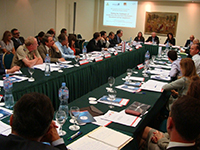International workshop: “Macedonia and its Neighbors”

Analytica had the pleasure to co-host the international workshop “Meeting the Challenges of EU Membership and NATO Accession – Macedonia and its neighbours” from 27 to 29 September 2012 in Hotel Holiday Inn, Skopje.



Analytica had the pleasure to co-host the international workshop “Meeting the Challenges of EU Membership and NATO Accession – Macedonia and its neighbours” from 27 to 29 September 2012 in Hotel Holiday Inn, Skopje.
The partners to this project are:
- Analytica Think Tank, Skopje/Macedonia
- Austrian National Defence Academy, Vienna/Austria
- Directorate General for Security Policy at the Austrian Ministry of Defence and Sports, Vienna/Austria
- PfP Consortium Study Group “Regional Stability in South East Europe”
- Progres Institute for Social-Democracy, Skopje/Macedonia
This workshop is part of the regular activities of the Study Group “Regional Stability in South East Europe”, Partnership for Peace Consortium. Additional information for the study group could be found at https://pfpconsortium.org/node/5/about.
Topic outline:
The main topic of the workshop was “Macedonia and its neighbors” and referred to the existing forms of cooperation as well as the challenges that the countries from the region are facing on the road to EU and NATO. The impact that the Macedonian neighbors have on its Euro-Atlantic integration and the perspectives of the international community has been discussed as well.
Key questions that more than 40 domestic and foreign experts and representatives from state institutions were trying to answer are:
- With all the countries from the region rushing to reserve a seat in both EU and NATO, where is Macedonia today?
- How does Macedonia cope with internal challenges and relations with the neighbours?
- What role can the countries from the region play in speeding up the processes of Macedonia’s EU and NATO integration, especially now as Macedonia shares borders with three NATO and two EU member states?
- If Macedonia continues to sit in EU and NATO's waiting rooms, then what are the consequences for the country, for the regional dynamics and for the overall enlargement process of the Western Balkans?
Opening addresses were given by Amb. Thomas Baier, Austrian Ambassador to Macedonia and COL Ljube Dukoski, Director General for Security Policy, Macedonia.
Please find attached the program of the workshop.
